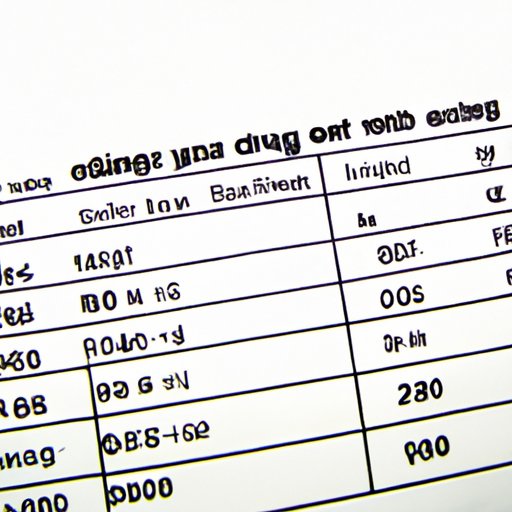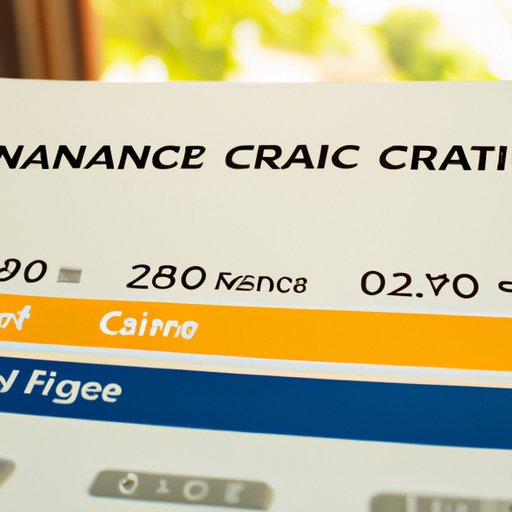Introduction
A finance charge is an additional fee charged by a lender or creditor when a borrower takes out a loan or uses a credit card. It is designed to compensate the lender for the cost of providing the loan or credit and is usually expressed as an interest rate. The purpose of calculating a finance charge is to determine how much a borrower will be required to pay back for a loan or credit.
Step-by-Step Guide to Calculating a Finance Charge
Calculating a finance charge can be a complicated process. Here is a step-by-step guide to help you understand and calculate your finance charge:
Gather Necessary Information
The first step in calculating a finance charge is gathering necessary information. You will need to know the principal amount of the loan or credit, the length of time the loan or credit will be outstanding, the applicable interest rate, and any additional fees that may apply.
Understand the Formula
The formula for calculating a finance charge is simple but important to understand. The formula is:
Finance charge = Principal Amount x Interest Rate x Time Period.
Use the Formula to Calculate the Finance Charge
Once you have gathered the necessary information and understand the formula, you can use it to calculate the finance charge. For example, if you have a loan for $10,000 with an interest rate of 6% and a term of one year, the calculation would be:
Finance charge = $10,000 x 6% x 1 year = $600.

The Basics of Calculating a Finance Charge
It is important to understand the basics of calculating a finance charge in order to accurately estimate the total cost of a loan or credit. There are two main types of interest rates that can be used to calculate a finance charge: fixed and variable.
Types of Interest Rates
Fixed interest rates remain the same throughout the term of the loan or credit. This means that the finance charge will be the same each month. Variable interest rates, on the other hand, can fluctuate over time. This means that the finance charge could change from month to month.
Factors Affecting Interest Rates
The interest rate used to calculate a finance charge is determined by several factors, including the borrower’s credit score, the type of loan or credit taken out, the length of the loan or credit, and the lender’s policies. It is important to understand these factors in order to accurately estimate the finance charge.
An Overview of How to Calculate a Finance Charge
There are several formulas used to calculate a finance charge. These include simple interest, compound interest, and the Rule of 78s. Each formula has its own advantages and disadvantages and should be carefully considered before using it to calculate a finance charge.
Different Formulas Used for Calculating a Finance Charge
Simple interest is calculated by multiplying the principal amount by the interest rate and dividing it by the number of days in the term. Compound interest is calculated by adding the interest payments to the principal amount and then multiplying this amount by the interest rate. The Rule of 78s is a special formula used to calculate a finance charge for loans that are paid off early.
Examples of How to Calculate a Finance Charge
For example, if you have a loan for $15,000 with an interest rate of 7% and a term of five years, the calculation using simple interest would be:
Finance charge = $15,000 x 7% x 5 years = $6,300.
Using compound interest, the calculation would be:
Finance charge = ($15,000 + $6,300) x 7% x 5 years = $9,810.

Exploring the Different Formulas Used to Calculate a Finance Charge
When calculating a finance charge, it is important to understand the different formulas used and the advantages and disadvantages of each. Here is a brief overview of the different formulas used to calculate a finance charge.
Simple Interest
Simple interest is the most basic and straightforward formula used to calculate a finance charge. It is calculated by multiplying the principal amount by the interest rate and dividing it by the number of days in the term. The advantage of using simple interest is that it is easy to calculate and understand. The disadvantage is that it does not take into account fluctuations in the interest rate over time.
Compound Interest
Compound interest is more complex than simple interest and takes into account fluctuations in the interest rate over time. It is calculated by adding the interest payments to the principal amount and then multiplying this amount by the interest rate. The advantage of using compound interest is that it takes into account changes in the interest rate over time. The disadvantage is that it is more difficult to calculate and understand.

A Comprehensive Guide to Calculating a Finance Charge
Calculating a finance charge can be a daunting task. Here is a comprehensive guide to help you understand and calculate your finance charge:
Understanding the Different Forms of Interest
The first step in calculating a finance charge is understanding the different forms of interest. As discussed above, there are two main types of interest rates: fixed and variable. Knowing the difference between these two types of interest rates can help you determine which type of interest rate is best for your situation.
Calculating the Interest Rate
Once you have determined the type of interest rate you want to use, you can then calculate the interest rate. This is done by multiplying the principal amount by the interest rate and dividing it by the number of days in the term. For example, if you have a loan for $20,000 with an interest rate of 8% and a term of two years, the calculation would be:
Interest rate = $20,000 x 8% / 2 years = 4%.
Calculating the Finance Charge
Once you have calculated the interest rate, you can then use it to calculate the finance charge. This is done by multiplying the principal amount by the interest rate and multiplying it by the length of the term. For example, if you have a loan for $20,000 with an interest rate of 4% and a term of two years, the calculation would be:
Finance Charge = $20,000 x 4% x 2 years = $1,600.
Understanding the Factors Involved in Calculating a Finance Charge
In addition to understanding the different formulas used to calculate a finance charge, it is also important to understand the factors that can affect the amount of the finance charge. These factors include credit card interest, loan interest, and late payment fees.
Credit Card Interest
Credit card interest is the fee charged by credit card companies for using their services. It is usually expressed as an annual percentage rate (APR) and can vary significantly depending on the type of card and the issuer. It is important to understand credit card interest in order to accurately estimate the cost of using a credit card.
Loan Interest
Loan interest is the fee charged by lenders for providing a loan. It is usually expressed as an annual percentage rate (APR) and can vary significantly depending on the type of loan and the lender. It is important to understand loan interest in order to accurately estimate the cost of taking out a loan.
Late Payment Fees
Late payment fees are fees charged by lenders for late payments. They are usually expressed as a flat fee and can vary significantly depending on the lender. It is important to understand late payment fees in order to accurately estimate the cost of making a late payment.
Conclusion
Calculating a finance charge can be a complicated process. It is important to understand the different formulas used to calculate a finance charge, as well as the factors that can affect the amount of the finance charge. With the right information and understanding, you can accurately estimate the total cost of a loan or credit.
(Note: Is this article not meeting your expectations? Do you have knowledge or insights to share? Unlock new opportunities and expand your reach by joining our authors team. Click Registration to join us and share your expertise with our readers.)
